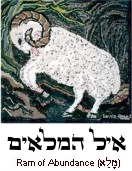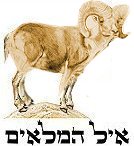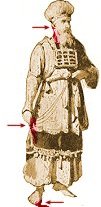|
|
 |
 |
 |
 |
|
Weekly Torah Reading
|
|
|
|
Parashat Tzav ("Command!")
|
|
|
Click on the links to display the Scriptures:
|
|
|
|
 |
 |
 |
|
Torah Reading Overview
|
|
|
|
Parashat Tzav continues God's instruction to Moses regarding the laws of korbanot, the animal and meal offerings at the Mishkan (tabernacle). Many of the laws of the sacrifices are repeated from last week's parashah, though this time Moses addresses the kohanim (priests) directly and additional details are provided. For example, the priests were to ensure that the fire of altar never went out and that the whole burnt offering (olah) was consumed as it burned throughout the night. Additional rules concerning the removal of ashes from the altar, the portion of the offerings that were given to the priests, and the cleansing of utensils are given.
The parashah begins:
|
|
|
 |
 |
|
The LORD spoke to Moses, saying, "Command Aaron and his sons, saying, This is the law of the burnt offering. The burnt offering shall be on the hearth on the altar all night until the morning, and the fire of the altar shall be kept burning on it. (Leviticus 6:8-9 [1-2,h])
|
 |
 |
|
The Five Types of Korbanot
|
 |
 |
|
Like parashat Vayikra, there are five types of korbanot discussed in parashat Tzav, though additional details are provided regarding each sacrifice:
- Olah (עלָה), an "ascending offering": This was a freewill (i.e., nedavah: נְדָבָה) sacrifice that was consumed entirely by the fire on the altar. The sacrificial victim must be an animal or a bird that is without defect. As the animal is slaughtered, the kohen catches its blood in a pan and sprinkles it (zerikat hadam) on the altar. The animal is then cut up, salted, and entirely burned. Normally, semichah (leaning of the hands on the head of the animal) and viduy (confession of sin) accompanies this sacrifice (though in the case of a bird olah, semichah is not performed). This parashah adds that Olah sacrifices must only be offered during daylight hours and must burn through the night. The kohanim, therefore, needed to be present at the mishkan around the clock, tending to the sacrifices and ensuring that the fire for the mizbeach (altar) would never go out.
- Minchah (מִנְחָה), "meal offering": This was a nedavah (freewill or gift) offering of flour (prepared with fine flour, olive oil and frankincense), usually brought by a person of modest means. Part of the meal offering is burned on the altar, and the remaining part is eaten by the kohanim (the word "mincha" means gift). Note that any flour offering must be baked quickly to prevent the dough from rising (i.e., unleavened bread). Like the animal sacrifices, minchah offerings must also be salted.
The Kohen Gadol (High Priest) was required to offer minchah offerings. First, he was required to offer minchat chinuk, a special offering that was given in the morning and afternoon on the first day of his avodah (service) as High Priest. Second, he was required to offer daily minchah as long as he served as High Priest.
- Shelamim (שְׁלָמִים), "peace offering": This was a nedavah (freewill) offering (eaten by the one bringing it) given as a way of expressing thanks to God on joyous occasions. Semichah is performed, though instead of viduy, praise to the LORD is offered. The offerer must "wave" the offering before the LORD (tenufah) and part of the meat given to the kohanim (priests).
A subset of the peace offering was the "thank offering" (זבֵחַ תּוֹדָה), which was to be given whenever a Jew had reason to recite Birkat HaGomel for deliverance from some danger. This offering included no less than 40 loaves of bread (10 with chametz, 30 without) that had to be consumed within 24 hours. The requirement for so much food was so that family and friends would come together and celebrate the goodness of the LORD for His acts of mercy and deliverance. According to midrash, in the days of Messiah all sacrifices will be annuled except for the thank offering (Lev. Rabbah 9:7).
- Chatat (חַטַּאת), "sin offering": This was a chovah (required) offering to make atonement for certain sins committed unintentionally by an individual (by the High Priest, the entire community, the king, or the ordinary Jew). Note that there is no explicit sacrifice for deliberate, intentional, and willful sins against the LORD, but instead punishment by an early death. Note that the blood for the sin offering was used in the mishkan, though the flesh and hide were to be burned outside the camp.
- Asham (אָשָׁם), "guilt offering": This was a chovah (required) offering as part of the penitence required for certain improper acts (e.g., retaining another's property by swearing falsely). (In each case, the wrongdoer was required to restore the property plus an additional 20% to its rightful owner before he could offer this sacrifice and receive forgiveness.) Note that the blood for the guilt offering was used in the mishkan, though the flesh and hide were to be burned outside the camp.
Note that this parashah adds that the Chatat and Asham offerings were to be made at the same place (i.e., the north side of the mizbeach) as the Olah offering, suggesting that this was to spare any embarrassment for the Jew who came to confess sin (viduy) and be reconciled to God. If someone saw his friend offering korban, he would then not know if it were for Olah or for Chatat or Asham.
The Talmud (Yoma 2:2) states that five miracles occurred with the fire that descended from heaven:
- The flame lay on the altar (i.e., mizbe'ach: מִזְבֵּחַ) in the form of a lion.
- The fire shone as brightly as the sun.
- The fire actually had a substance.
- The fire consumed wet and dry alike.
- The flame did not produce any smoke.
Jewish midrash states that the meat of the korbanot never spoiled, even if it took days before it was burned upon the altar. Moreover, despite the presence of blood all over the mishkan, no flies swarmed the area on account of its special sanctity.
|
 |
 |
|
Terumat Ha'deshen - Offering of Ashes
|
 |
 |
|
Every morning a selected priest had to lift a shovel full of ashes from the altar and put them beside the altar. He would then change out of his priestly clothes and take the ashes outside the mishkan to a "clean place." This is sometimes called "terumat hadeshen."
A midrash states that this was not for the purposes of cleaning the altar, since the ashes were miraculously "swallowed up" by the earth, but was a ritual enacted to instill humility in the heart of the priests.
|
 |
 |
|
Restrictions from eating fat and blood
|
 |
 |
|
For sacrifices that were to be eaten, additional restrictions about eating fat (chelev) and blood (dam) are provided. First, ritual slaughter (shechitah) must be performed at the altar. The meat must then be soaked in water, taken out after no less than 30 minutes, and then salted and laid out on an incline (to draw out the blood). The fatty parts must next be removed by a menaker, and only then can the meat be considered fit for consumption.
In this connection note that the chelev (fat) that is forbidden is from the animals fit for sacrifice, namely cows (oxen), goats, and sheep, but it refers particularly to specific fats found in certain places of these animals, such as the kidneys and liver. This seems to imply that other fat in the meat is permissible to be eaten. If you buy kosher meat, you do not have to worry about chelev, because the shochet will remove all the forbidden fat.
|
 |
 |
|
The Hamilu'im Offering and Dedication of the Mishkan
|
 |
 |
|
The parashah ends with the seven day consecration ceremony (yemei hamilu'im) of Aaron and his sons as the kohanim of the LORD. Each day Moses would gather all of Israel to the mishkan, wash Aaron and his sons, robe them in their priestly garments, and anoint them with shemen (oil). Moses then anointed the mishkan, its contents, the altar of burnt offering, and the laver and its base. He finally poured anointing oil upon Aaron's head, thus sanctifying him as mashiach.
Aaron and his sons (i.e., the kohanim) then performed semichah (leaning of hands upon its head) on the head of a bull for chatat (sin offering), and Moses took the blood and used it to consecrate the altar. He then burned the fat upon the altar and took the rest of the animal to be burned it outside the camp. After this, Moses offered two rams (eilim) upon the altar. The first lamb was a "food offering" olah, and the second was an "ordination" offering (the eil hamilu'im, or ram of dedication or consecration).
|
|
|
 |
 |
|
The blood of the eil hamilu'im was put on the right ear, right thumb, and big toe of the Aaron and his sons (a clear picture of Yeshua and His sacrifice as the coming greater High Priest) and the rest of the blood was dashed upon the sides of the mizbe'ach. After its slaughter, Moses took its innards and some unleavened bread and put them in the hands of the priests to perform tenufah (a wave offering) before burning them upon the altar (a picture of the resurrection). Finally, Moses mixed some of the blood of the eil hamilu'im and anointing oil and sprinkled it on the priest's garments to sanctify them.
|
|
 |
 |
|
Note that eil ha'milu'im literally means "the ram of fullness" (i.e. מָלֵא means "full"). As believers in Yeshua, we too have been anointed with the blood from the Ram of Ordination -- Yeshua as our Kohen Gadol of the better covenant! And we too have been anointed with the sacred shemen (oil) that symbolizes the presence and aroma of the LORD in our lives. Followers of Yeshua are therefore truly "...a chosen race, a royal priesthood, a holy nation, a people for his own possession, that you may proclaim the excellencies of him who called you out of darkness into his marvelous light" (1 Peter 2:9). Amen, and may the LORD be pleased to help you serve Him in the truth.
|
|
|
 |
 |
|
According to Jewish tradition, this entire ordination procedure was repeated for seven consecutive days, and each day Moses would literally reassemble the mishkan and go through all of the rituals listed above. Moses did so in order to teach the priests and Levites how to perform their various functions.
A Jewish midrash states that God did a miracle by supernaturally enlarging the mishkan so that "all Israel" could fit inside the courtyard! Since Israel was said to have constituted over 600,00 males over age 20, not including the women and children, the mishkan would have been enlarged to quite a large degree!
|
 |
 |
 |
 |
 |
 |
|
 |
|
|
|
Haftarah Reading Overview
|
|
|
|
The Haftarah for Tzav is an ominous warning regarding the coming destruction of Jerusalem and the captivity of Judah. This judgment resulted from a neglect of Temple worship and sacrifices, and rampant idolatry that even involved human sacrifice. On account of this, the LORD said, "I will silence in the cities of Judah and in the streets of Jerusalem the voice of mirth (kol sason) and the voice of gladness (v'kol simchah), the voice of the bridegroom (kol chatan), and the voice of the bride (v'kol kallah), for the land shall become a waste."
|
|
|
 |
|
|
|
Brit Chadashah Overview
|
|
|
|
The reading from the Brit Chadashah concerns the role of the Mashiach Yeshua as our Kohen Gadol (High Priest), who was authorized by the word of oath from God Himself to be the Mediator of the New Covenant, based on better promises. Instead of the daily sacrifices offered by the earthly priests in the physical mishkan (and later at the temple), Yeshua, God the Son, once for all offered Himself up as the Sin Bearer of the world, in the holy places "made without hands," that is, in the true reality of which the mishkan was only a shadow. Believers in Yeshua have a new altar, "whereof they have no right to eat who serve the tabernacle" (Hebrews 13:10).
Consequently, he is able to save to the uttermost those who draw near to God through him, since he always lives to make intercession for them (Hebrews 7:25).
Blessing:
|
|
 |
|
|
 |
|
|
 |
 |
|
For Further Study:
|
|
|


![Leviticus 6:8-9 [6:1-2h] (BHS)](../../../../Scripture/Parashah/Summaries/Tzav/lev6-8-9-2.gif)



